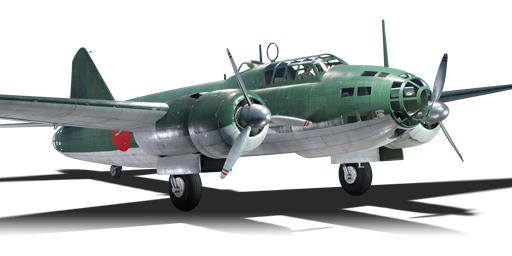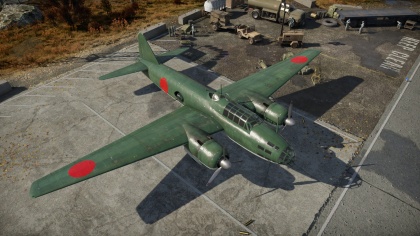Difference between revisions of "G4M1"
Eagleeye0815 (talk | contribs) m (→Flight Performance) (Tag: Visual edit) |
|||
| Line 272: | Line 272: | ||
* ''other literature.'' | * ''other literature.'' | ||
| + | {{AirManufacturer Mitsubishi}} | ||
{{Japan bombers}} | {{Japan bombers}} | ||
Revision as of 19:27, 31 December 2019
Contents
Description
The G4M1 is a Rank II Japanese bomber
with a battle rating of 3.0 (AB/SB) and 2.7 (RB). It has been in the game since the start of the Open Beta Test prior to Update 1.29. The Americans nicknamed it "Betty", whilst the Japanese called it "Hamaki" ("cigar" or "leaf roll").
This vehicle is more dangerous the longer it stays in game- this is because, whilst it's armament of 4 x 250 kg bombs is a small one for its BR and rank, it can destroy most targets that it will encounter with these bombs, so more bombing runs make it more devastating to the enemy ticket counter. This plane can be used as a base bomber, but this normally results in death, as the enemy climbs to meet you and it only takes a few shots to destroy you. The G4M1's most effective play is destroying ground targets like Light Pillboxes, tanks and gun emplacements; the 250 kg bombs work on ships well too. It is not suggested to climb in the G4M1, as you need the protection of air superiority to be secure higher up, but the Allied aircraft you face will engage your fighters before they reach you.
Accuracy is everything with the G4M1. You need to be on target with your rear gunner, otherwise an enemy sitting behind you will make quick work of you. The 20 mm cannon is devastating if you hit- this can be hard for novice bomber pilots, but expert bomber pilots will know where to aim. The other guns on the G4M1 have little effect, but try to use them if the enemy is closing in in that direction.
General info
Flight Performance
| Characteristics | |||||||
|---|---|---|---|---|---|---|---|
| Stock | |||||||
| Max Speed (km/h at 6,000 m) |
Max altitude (meters) |
Turn time (seconds) |
Rate of climb (meters/second) |
Take-off run (meters) | |||
| AB | RB | AB | RB | AB | RB | ||
| 431 | 422 | 8000 | 33.2 | 33.6 | 5.1 | 5.1 | 314 |
| Upgraded | |||||||
| Max Speed (km/h at 6,000 m) |
Max altitude (meters) | Turn time (seconds) | Rate of climb (meters/second) |
Take-off run (meters) | |||
| AB | RB | AB | RB | AB | RB | ||
| 471 | 452 | 8000 | 31.2 | 32.0 | 10.2 | 7.2 | 314 |
Details
| Features | ||||
|---|---|---|---|---|
| Combat flap | Take-off flap | Landing flap | Air brakes | Arrestor gear |
| X | ✓ | ✓ | X | X |
| Limits | ||||
|---|---|---|---|---|
| Wing-break speed (km/h) |
Gear limit (km/h) |
Combat flap (km/h) |
Max Static G | |
| + | - | |||
| 540 | 300 | 450 | ~3 | ~2 |
| Optimal velocities | |||
|---|---|---|---|
| Ailerons (km/h) |
Rudder (km/h) |
Elevators (km/h) |
Radiator (km/h) |
| < 360 | < 360 | < 280 | > 250 |
| Compressor (RB/SB) | ||
|---|---|---|
| Setting 1 | ||
| Optimal altitude | 100% Engine power | WEP Engine power |
| 2,600 m | 2,800 hp | 3,125 hp |
| Setting 2 | ||
| Optimal altitude | 100% Engine power | WEP Engine power |
| 5,600 m | 2,560 hp | 2,857 hp |
Survivability and armour
- No armour plating
- No armour glazing
- Critical components located at front of aircraft (fuel, pilot, engine, controls)
- More fuel tanks located in wings near fuselage
Armaments
Offensive armament
Suspended armament
Main article: Bombs
The G4M1 can be outfitted with the following ordnance:
- 12 x 60 kg Navy Type 97 Number 6 ground bombs (720 kg total)
- 4 x 250 kg Navy Type Number 25 Model 2 bombs (1,000 kg total)
- 4 x 250 kg Type 98 bombs (1,000 kg total)
- 1 x 500 kg Navy Type Number 50 Model 2 bomb (500 kg total)
- 1 x 835 kg Type 91 Mod. 2 torpedo
- 1 x 850 kg Type 91 Mod. 3 torpedo
- 1 x 800 kg Navy Type 99 Number 80 AP bomb (800 kg total)
- 1 x 800 kg Navy Type Number 80 Model 1 bomb (800 kg total)
Defensive armament
The G4M1 is defended by:
- 1 x 20 mm Type 99 Model 1 cannon, tail turret (1,000 rpg)
- 1 x 7.7 mm Type 92 machine gun, nose turret (1,000 rpg)
- 1 x 7.7 mm Type 92 machine gun, dorsal turret (1,000 rpg)
- 1 x 7.7 mm Type 92 machine gun, 2 x beam turret (1,000 rpg = 2,000 total)
Usage in the battles
Manual Engine Control
| MEC elements | ||||||
|---|---|---|---|---|---|---|
| Mixer | Pitch | Radiator | Supercharger | Turbocharger | ||
| Oil | Water | Type | ||||
| Controllable | Not controllable | Not controllable | Not controllable | Separate | Not ontrollable | Not controllable |
Modules
| Tier | Flight performance | Survivability | Weaponry | ||
|---|---|---|---|---|---|
| I | Fuselage Repair | Radiator | Turret 7 mm | 12 in (mod30) | |
| II | Compressor | Airframe | New 7 mm MGs (Turret) | 17 3/4 in (mod45) | |
| III | Wings Repair | Engine | Turret 20 mm | Improved Torpedo | |
| IV | Engine Injection | Cover | New 20 mm Cannons (Turret) | 14 in (mod35) | |
- This plane needs to be fast to avoid trouble and good at defending itself- stock, it can do both things, but not very well. It is suggested that you research Engine and flight performance as quickly as possible so you can skirt around the edge of the map, away from fighters. Alternatively, if you believe you can handle fighters, research the defensive armament lines first. Bomb load-outs are the next most important thing- fortunately, since research at this rank costs very little time, you can research defensive armament and bomb load-outs alternately; this will make the G4M1 an effective weapon. Protection is non-existent for the G4M1, so you should research survivability upgrades last, as it will not help you survive fighter attacks.
Pros and cons
Pros:
- Large armament variety, for different targets
- Fast
- Good maneuverability
- Good defensive capability with 1 x 20 mm cannon
Cons:
- No armor means it can't take very many hits without adverse effects
- Large wings means larger targets for the enemy
- No fuel tank protection, if ignited, it will burn until destroyed.
History
Designed as a lightweight medium bomber, the G4M1 sacrificed protection in order to achieve high-speed and an operational range of 2,850 km. Unfortunately, this made the plane extremely vulnerable to Allied fighters and anti-aircraft fire who found the engines and fuel tanks particularly flammable. The plane's finest hour was the sinking of the HMS Repulse and HMS Prince Of Wales, the first two capital ships sunk in open waters by aircraft during wartime.
The plane also played a role in the final hours of Admiral Isoroku Yamamoto. Two G4M1 bombers of the Kōkūtai 705, escorted by 6 A6M2 fighters Kōkūtai 204, were to carry him from Rabaul to Balalae Airfield near Bougainville Island. Admiral Yamamoto's purpose in traveling to Balalae Airfield was to inspect Japanese aircraft participating in Operation I-Go, and to boost morale following the intense battles at Guadalcanal. However, U.S. naval intelligence decrypted orders sent to Japanese commanders regarding the itinerary, escorting forces, and which units were be toured. In Operation Vengeance, 18 P-38G Lightnings were sent to intercept Yamamoto, which ended in both G4M1 bombers shot down. The bomber with Yamamoto crashed in the jungle, killing him, and the other, holding his staff, crashed at the sea.
Media
An excellent addition to the article will be video guides, as well as screenshots from the game and photos.
Read also
Links to the articles on the War Thunder Wiki that you think will be useful for the reader, for example,
- reference to the series of the aircraft;
- links to approximate analogues of other nations and research trees.
Sources
Paste links to sources and external resources, such as:
- topic on the official game forum;
- page on aircraft encyclopedia;
- other literature.
| Mitsubishi Company (三菱商会) | |
|---|---|
| Fighters | A5M4 · Hagiri's A5M4 |
| A6M2 mod. 11 · A6M2 · A6M3 · A6M3 mod. 22 · A6M3 mod. 22Ko · A6M5 · A6M5 Ko · A6M5 otsu · A6M5 Hei · A6M6c | |
| A7M1 (NK9H) · A7M2 | |
| J2M2 · J2M3 · J2M4 Kai · J2M5 · J2M5 (30 mm) | |
| Hydroplanes | F1M2 |
| Interceptors | Ki-83 · Ki-109 |
| Bombers | G4M1 |
| Ki-21-Ia · Ki-21-I hei · Ki-67-I Ko · Ki-67-I otsu | |
| Jet Fighters | Ki-200 |
| Captured | ▃A6M2 · ␗A6M2 |
| See also | Mitsubishi Heavy Industries, Ltd. (Post-War) |
| Japan bombers | |
|---|---|
| Navy | |
| Carrier-based attack bomber | |
| B5N | B5N2 |
| B6N | B6N1 · B6N2 · B6N2a |
| B7A | B7A2 · B7A2 (Homare 23) |
| Carrier-based dive bomber | |
| D3A | D3A1 |
| D4Y | D4Y1 · D4Y2 · D4Y3 Ko |
| Shipboard Observation seaplane | |
| F1M | F1M2 |
| Land-based Attack bomber | |
| G4M | G4M1 |
| G5N | G5N1 |
| G8N | G8N1 |
| Flying boat | |
| H6K | H6K4 |
| H8K | H8K2 · H8K3 |
| Land-based Bomber | |
| P1Y | P1Y1 |
| Army | |
| Light | Ki-32 |
| Ki-48-II otsu | |
| Heavy | Ki-21-Ia · Ki-21-I hei |
| Ki-49-I · Ki-49-IIa · Ki-49-IIb · Ki-49-IIb/L | |
| Ki-67-I Ko · Ki-67-I otsu | |
| Other countries | ▅B-17E |





